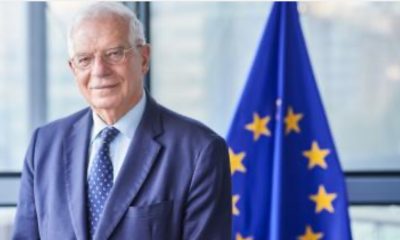пољопривреда
Борба против #глифосата у Бриселу


The long-running saga around glyphosate, the active ingredient in popular weed killers like RoundUp, will likely continue to roil Brussels through the German elections in September. Commissioner for Health and Food Safety Vytenis Andriukaitis has demanded a qualified majority vote on whether to extend the licence for the chemical, despite the fact that all of the major regulatory bodies that have studied glyphosate have found it to be safe for human use. Despite the weight of scientific evidence, the EU has never been able to reach the necessary majority in a vote because of political pressure exerted by environmental groups – writes Colin Stevens
Commissioner Andriukaitis has himself stated that he knows glyphosate to be safe. For the Lithuanian former heart surgeon, the decision to kick the issue into the long grass of a qualified majority vote is a way of avoiding a potential headache for the Commission. By forcing the key member states in question, France and Germany, to come off the fence and take responsibility for the decision, Andriukaitis and his colleagues wants to avoid an outcome where the Commission becomes a sacrificial lamb and takes the brunt of environmentalist criticism for an otherwise routine reauthorisation. Unfortunately, Angela Merkel and Germany will almost certainly continue to abstain despite her гласовна подршка for continued use, and the validation of glyphosate’s safety by BfR.
What could be causing both Brussels and Berlin to equivocate on science and their own better judgement? One non-regulatory agency that has muddied the waters on glyphosate safety. In 2015, an analysis by the Међународна агенција за истраживање рака found that glyphosate, which has been used by farmers and gardeners as a weed killer since the 1970s, was “probably carcinogenic”. Environmental campaigners quickly pounced on the finding, making it the touchstone for their anti-chemical campaign.
IARC’s controversial finding has pitted the agency, which operates under the aegis of the World Health Organisation and is based in Lyon, against 30 years of scientific consensus that has found no causal relation between glyphosate and cancer in humans. What led IARC to a conclusion that puts it at odds with the U.S. Environmental Protection Agency, the European Food Safety Authority, the European Chemicals Agency, Health Canada's Pest Management Regulatory Agency, New Zealand's Environmental Protection Authority, Japan's Food Safety Commission, and its own colleagues in the Светска здравствена организација?
As Ројтерс and the American investigative media site Мотхер Јонес revealed in a bombshell story last month, vital scientific data was withheld from the study. Since then, the revelations have cast serious doubt on the validity of its conclusions.
С обзиром на КСНУМКС, Здравствена студија пољопривреде in the United States has been conducting a study of 89,000 agricultural workers and their spouses in Iowa and North Carolina – a convincing sample size which has revealed no link between the weed killer and cancer. However, the AHS report was not taken into account because it hadn’t yet been published at the time of the IARC review. When asked whether IARC’s findings would have been different had the AHS data been included, Aaron Blair (who chaired the IARC group but also worked on the AHS study) admitted that it would have been.
According to Blair, IARC’s stipulations regarding unpublished studies prevented him from bringing to the group’s attention. Other scientists have criticised IARC’s refusal to consider the data and questioned why the panel of scientists, who possess the expertise necessary to review and evaluate the evidence available to them, would decline to do so. While the NIH has vowed to ensure the AHS report does get published this year, the damage has already been done. IARC’s report made headlines, emboldening activist groups to pressure governments into banning one of the world’s best-selling and most effective weed killers.
With Angela Merkel facing re-election this year, her likely abstention is predicated entirely on avoiding damage to prospects of a potential coalition with Germany’s Green Party. Were glyphosate reauthorisation to ultimately fall through, the cost of this political expedience would be severe for farmers across the EU. Research in Great Britain has estimated that a ban on glyphosate could result in losses of £ 940 милиона and 20 percent drop in wheat production in the UK alone.
Even more importantly, the damage to Europe’s regulatory institutions could be immeasurable. The glyphosate controversy, and accusations by activists that the European food and chemicals safety agencies were working in coordination with industry, have already undermined the public’s trust in the agencies tasked with ensuring the safety of European citizens. The напред-назад of letters from academics on either side of the debate urging each other to reconsider their positions, has only served to confuse Europeans about the quality of the scientific advice they receive. Having found a blueprint for throwing the safety of any product into doubt, anti-glyphosate campaigners are hardly likely to make glyphosate the last issue they turn into a regulatory hot potato.
If the glyphosate ban does go ahead, it could result in a similar outcome to what happened when Бисфенол А, a chemical used in the manufacture of plastics, was outlawed over similar fears. Manufacturers substituted it with Bisphenol S, which is nearly identical but less thoroughly tested and understood. Losing glyphosate would not end farmers’ need for an effective weed killer. It would simply force them to use a different, less well-tested alternative, doing precisely nothing to advance the cause of environmentalism.
Поделите овај чланак:
-

 КонференцијеПре КСНУМКС дана
КонференцијеПре КСНУМКС данаБриселска полиција зауставила је конференцију НатЦон-а
-

 Масовни надзорПре КСНУМКС дана
Масовни надзорПре КСНУМКС данаЦурење: Министри унутрашњих послова ЕУ желе да се изузму од масовног скенирања приватних порука контроле ћаскања
-

 КонференцијеПре КСНУМКС дана
КонференцијеПре КСНУМКС данаНатЦон конференција ће се одржати на новом месту одржавања у Бриселу
-

 Европска служба за спољне послове (ЕААС)Пре КСНУМКС дана
Европска служба за спољне послове (ЕААС)Пре КСНУМКС данаБорел пише опис свог посла
























